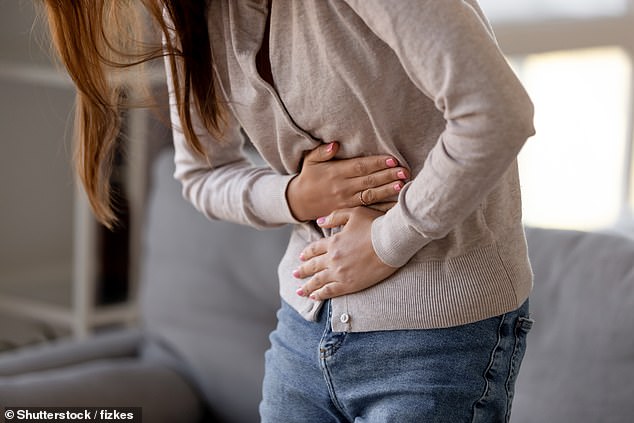Doctor reveals how to deal with one of the most embarrassing side effects of anxiety – and why it happens
You’re getting ready to give a big show at work, when suddenly nature calls.
Your neurological journey can be explained by the invisible cord that connects your head to your gut, said Dr. Nicole Cain, who lives in Arizona.
Doctors have only recently begun to explore the complex relationship between the brain and the digestive system.
“In the gut and the brain, they communicate in two directions and that’s called the gut brain microbiome, or the microbial axis in the brain,” Dr Cain told DailyMail.com.
And we’ve found that gut microbes actually speak louder than the brain.’

The feelings in your stomach that you may feel when you are nervous are evidence of the gut brain axis
His advice is to practice breathing deeply, slowly, when you feel anxiety building up. Avoiding foods high in fiber and caffeine can also reduce the effects.
Dr. Cain first focused on the gut-brain connection in medical school after seeing a patient with crippling Crohn’s disease and anxiety.
The patient spent days lying on the bathroom floor, suffering from joint pain and chronic diarrhea, and there was no effective treatment.
Ultimately, targeted therapy helped her get her GI symptoms under control, and at the same time, her anxiety seemed to magically disappear.
This, Dr Cain said, made him think: ‘There is something deeper in this relationship.’
Before a first date, a big test or a public speech, our brains may begin to emit symptoms of stress and anxiety.
These tell the body to release chemicals such as cortisol, serotonin and adrenaline.
These messengers travel throughout the body, sending your heart rate and blood pressure into overdrive and attaching to receptors in the gut.
This causes a ‘hard, or moving’ feeling, and stimulates your bowels and creates waves of contractions that tell you to go to the porcelain throne.
You may find that when the anxiety is gone, you no longer have to go.
Sometimes, your body is really working on something in this storm, and it releases only when you can relax, and your body can leave the seat.
‘Right after the adrenaline rush is when everything can start hitting you at once,’ epileptologist Dr Christine Lee told the Cleveland Clinic.
On the other hand, stress can also affect the gut.
For some people dealing with depression, the condition is caused by an imbalance of chemicals called neurotransmitters.
Serotonin is a neurotransmitter that helps regulate sleep, libido, mood and digestion. Between 90 and 95 percent of it is made in the digestive system, according to the University of Pennsylvania.

Dr. Cain became attuned to the brain-body after a patient with severe Crohn’s disease and anxiety seemed to heal at the same time.
This has led researchers to hypothesize that in some depression patients, the problem may be due to a malfunctioning gut – as it is possible that their digestive system does not produce enough serotonin to support the brain. it works well.
In addition, serotonin itself makes changes in the gut.
‘There are more serotonin receptors in the gut than in the brain. Because of this, serotonin plays as big a role in the gut as it does in the brain’ Dr Lee said.
In the GI tract, serotonin helps control how fast food moves through your gut, how much fluid is produced to help break down and move food, and how sensitive you are to emotions such as hunger and stomach pain.
Research has found similar, surprising links between gut health and depression.
Injecting stool samples from depressed people into mice without the bacteria caused them to develop symptoms of depression, such as a lack of interest in their usual activities, a 2016 University College London study found. Cork got it.
A large 2023 study that examined stool samples from more than 1,000 people found that those with depression all had lower levels of a bacteria called Eubacterium ventriosum, compared to people without. emotional stress.
This suggested that a lack of this bacteria may be contributing to the condition.
One final gut-brain connection shown is through the Vagus nerve, Dr. Cain said.

Hormones and neurotransmitters released during the stress response have many receptors in the gastrointestinal tract.
The vagus nerve is one of 12 major nerves that travel from the brain to the body. It controls many functions that you cannot control on your own, including digestion, heart rate and immune system.
One of its key features is to move your body from stress to decompress. After you leave a stressful situation, your vagus nerve activates, stabilizes your heart rate, reduces anxiety and strengthens your immune system.
This also allows your intestines to relax, work to digest food and provide energy at a slower pace.
Some naturopaths, like Dr Cain, say this system can be ‘tricked’ to your advantage. If you find yourself feeling anxious or stressed in a situation you don’t need to, you can try activating your vagus nerve, putting your body and your gut through a difficult adjustment.
Deep breathing exercises, mindfulness, cold exposure and meditation can reactivate your vagus nerve — calming you down, Dr. Cain said.
Whether it’s anxiety, depression or a simple vagus nerve, each of us has to deal with the amazing interaction between the gut and the brain, Dr. Cain said, ‘instead of feeling you are embarrassed and ashamed of it, it is to understand that this is your body that gives it. your details.
‘In general, we are products of our guts.’
#Doctor #reveals #deal #embarrassing #side #effects #anxiety